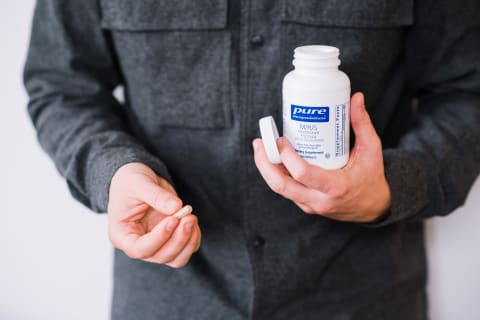Advertisement
A Functional Medicine Expert's 6 Supplement Rules To Live By

I am an über-nerd when it comes to supplements and love to research the latest and greatest in order to stay up-to-date with the best supplements for not only my patients in my functional medicine clinic but for myself and my family. But the internet is a double-edged sword. On the one hand, it can be a great resource to quickly find answers to your health questions. But on the other hand, it can be filled with conflicting and oftentimes completely wrong information.
You would think a topic like supplements would be an easy enough one to Google. After all, it’s not brain surgery! However, with thousands of supplements on the market, part of the problem is knowing where to start and how to narrow down your search. There are also many different types of supplements, such as multivitamins, omega fats, single vitamins like vitamin D, single nutrients like magnesium, and so much more.
After years of research, there are a few things I make sure everyone who wants to take supplements knows about them in order to make the most informed decision about their health:
1. Personal biochemistry matters.
What are supplements designed for? To bring in additional support for something that is lacking. If you are low in vitamin D, you probably need to take a vitamin D supplement. If your body has trouble with methylation and detoxification, you need to take activated B vitamins—the fuel behind methylation. Your functional medicine practitioner can help with a genetic test that may help determine whether your body has difficulty processing nutrients.
Ultimately, supplements are about quality—not quantity. You can be taking handfuls of supplements every day, but unless you are taking the right ones for your body, you’re not going to notice much difference in your health. Make sure to work with your functional medicine practitioner, who can run diagnostic labs to determine which supplements are right for your specific health case. If you have previously taken one of the popular at-home genetic tests, your doctor can help you translate your results into personalized supplement recommendations, using PureGenomics.

2. Sourcing is paramount.
How an ingredient is sourced plays a big role in how well the supplement made from that ingredient actually performs. For example, if certain herbs aren’t grown in a non-contaminated environment, they can be exposed to multiple kinds of chemicals, toxins, and pesticides. These end up directly inside your supplement and thus, in your body, where they can actually do more harm than good. Look for quality, health-care-practitioner-supported brands that are transparent about their sourcing.
3. You want a company that conducts extensive ingredient testing and research.
Just because something says it’s natural or organic doesn’t mean that it is good for you. And since toxins are not visible to the naked eye, extra steps need to be taken to guarantee each ingredient is truly pure. That’s why it’s important to get your supplements from a reputable brand that goes the extra mile with their time and money to test every ingredient for factors like purity, potency, heavy metals, pesticides, allergens, and microbial contaminants.
4. Manufacturing procedures aren't all created equal.
Manufacturing is a factor that is just as important as ingredient quality but often gets overlooked. Supplements need to be produced in dust-, temperature-, and humidity-controlled facilities in order to avoid unwanted bacterial growth. And to eliminate the risk of cross-contamination, companies need to have proper procedures in place for every step of the process, including having quality assurance specialists who inspect supplement quality regularly.
5. Not all supplements are hypoallergenic.
For anyone with an obvious allergy, this is an automatic deal-breaker. A lot of companies use unnecessary fillers and preservatives as well as coatings and shellacs, which can severely irritate someone struggling with gut issues or less obvious food intolerances, too. This is just as important as the quality of the ingredients inside. Companies who value this will state on their label that they are gluten-free, non-GMO, and hypoallergenic.

6. Transparency is a very good sign.
When brands have high quality standards, they like to show that off right on the bottle! Do your research, and you’ll find that reputable companies like Pure Encapsulations are extremely transparent when it comes to manufacturing and sourcing. They go above and beyond to make sure you have no questions left unanswered; they meet every single one of these standards and more, which is why they are the No. 1 most trusted health care practitioner brand.

What Men Are Getting Wrong About Mental Health, From A Psychologist
Stephen B. Poulter, PhD

Your Grandma's Go-To Supplement Is Once Again Popular (For A Good Reason)
Molly Knudsen, M.S., RDN

What Men Are Getting Wrong About Mental Health, From A Psychologist
Stephen B. Poulter, PhD

Your Grandma's Go-To Supplement Is Once Again Popular (For A Good Reason)
Molly Knudsen, M.S., RDN














